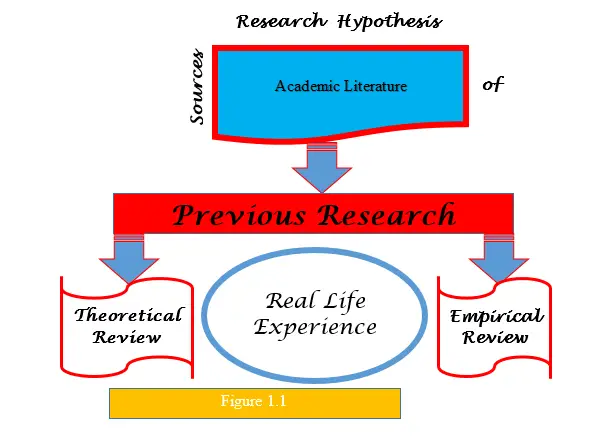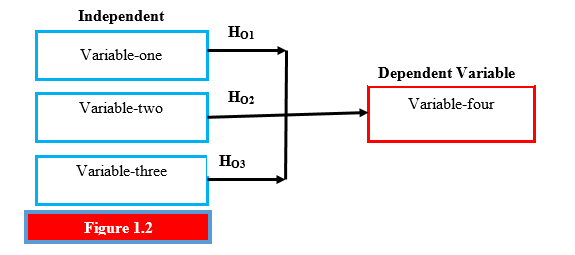Sources of hypothesis
Introduction
How does research hypothesis evolve? Where do this hypothesis originate from? Generation of research hypothesis is manifold and intertwined with many perspectives. The following is a quick summary of the diverse sources of research hypothesis as per the discussion we have in our hypothesis article .
Premonition or intuition/personal insight;
This is an original idea or a virgin idea that one comes up with. This implies that it is an idea that has never been in existence before. For instance, in Kenya there is M-Pesa idea of money transfer from one person to another using a mobile phone. For many decades, just like any other economy, Kenya as a country only transacted with banks and other financial institutions for cases like that of money transfer and payments. Similarly, IKO-Toilet idea is also a newly introduced viewpoint where individual groups or private arm have taken over previously less managed public toilet facilities were, they maintain and manage the same facilities so as to offer improved services by charging a small fee.
Research Findings
From other research findings as per past literature review, one can develop a new hypothesis. For example, when writing academic papers such as projects and PhD thesis, the researcher considers the specific objectives of past studies and the research findings so as to establish the research gaps which are the foundation of the current study hypothesis formulation or development..
Existing Theory or set of Theories
A Theory is a supposition or a system of an idea intended to explain something, especially one based on general principles independent of the thing to be explained. For example, in Economics, price of a normal good determines the quantity of the commodity to be bought (i.e. demanded). Further hypothesis can be based on the utility derived from the commodity such that a hypothesis can be framed stating that the reason why the quantity demanded will change is due to the level of utility derived from a commodity but not necessarily the increase in price. This is an explanatory theory/hypothesis.
Social cultural setting
Cultural values and beliefs initiate hypothesis development by social researchers/scientists. The “How” social settings behave can be a source of hypothesis. For example, the rate of school drop outs in primary schools amongst Maasai community is due to the cultural value attached to cattle. So a hypothesis can be framed from this argument.
Analogy
An analogous situation is a case of similarity, equivalence or likeness which the researcher can replicate to form a hypothesis. Example is when a scenario is set based on real life situation.
Personal Experience
Past experience of the researcher may help in designing the hypothesis. Past experience on debt collection amongst poor community customers can aid in hypothesis setting. For instance, the chances of clearing a debt amongst the poor is alarming in Haiti.
Structural sources of hypothesis
The structural sources of research hypothesis is demonstrated by Figure 1.1 below

Academic Literature
The journey or procedure of deriving into research hypothesis originates majorly from the academic literature which is always presented in the literature review of a project or thesis. This matter comprises past or previous research work by your researcher predecessors.
It should be clearly understood that there is no way a researcher can develop a hypothesis from the blues. It cannot be a case of abstract argument but should originate from similar past literature undertaken by others in a certain field of your interest. The past literature work is founded under “Theoretical framework”:
Theoretical Framework
The term theoretical framework originates from the term “Theory” So, what is a theory? And why do we need to look at theory first before checking on theoretical framework? This is explained as follows;
Definition: A theory is a supposition or a system of ideas intended to explain something, especially one based on general principles independent of the thing to be explained.
Or
A plausible or scientifically acceptable general principle or body of principles offered to explain phenomena (Merriam Webster Dictionary).
Therefore, a theory is a rational type of abstract thinking about a phenomenon, or the results of such thinking and it provides a generalized explanations of how variables link with one another in the natural phenomenon.
Allow me I brain storm you with ONE question pertaining theory which can be food for thought although I will provide the answer right away.
Why is “theoretical foundation” discussed first when writing an academic proposal or thesis?
NB: Am not talking of “theoretical review”
To answer this question, I will challenge you on the following scenario…..
“Why do we have old women rush to buy more goods from the market when the prices decrease and they have may be never been to an Economics class on the subject of price determining quantity demanded-holding other factors constant?”
The answer is: This is because the theory of demand applies naturally to the market players. The old women or even most people have never been in to an Economics class to learn the theory of demand.
But the theory of demand states that “When the price of a commodity decrease, the quantity demanded increases and when the prices increase, the quantity demanded decreases, holding other factors constant”
So who directs the market players in the market, whether educated or unschooled on how to respond to changes in prices accordingly? This takes us to the uniqueness of a theory;
A THEORY is automatically adoptable to those it applies to. So it is easily followed and without any push or coaxing by anybody. People will just comply because they portray how diverse characteristics in them manifest themselves in the natural phenomenon.
A THEORY is logical. It is plausible. This means it represents what is logical. For instance, a dog will always bit man which is logical, hence not news to us. However, if man bites the tail of a dog, the news will hit the headlines on our TV screens. This is because this is not logical as benchmarked by nature or physical structure in the natural phenomenon. In fact biting the dog’s tail is abnormal.
A THEORY represents normality state. Normality state is the general expectations that we have over a matter or an issue given the underlying conditions and assumptions. In normal circumstances, we expect variables to relate in a certain manner which is the theory. So with a theory there is no conflict of observation.
A THEORY is testable-meaning it can be proven empirically or disapproved in the same manner. It can practically be assessed whether it truly represents the expected behavior. For instance, the Isaac Newton theory of gravity whereby it is empirically proven that the earth attracts all mass towards its Centre.
So, a theory is the backbone of all research. You cannot do research without theories for they describe the natural phenomenon workings which we endeavor to explain in our research thesis.
I always find it laughable when I hear students misquote the term THEORY. Especially when they have been taught in class in a manner that is bogus. They normally say, they have been taught “theory only”. What they imply is that they have been poorly taught in class for the teacher used handouts or carelessly used dictation method to teach and therefore they did not understand.
The common saying of “we were taught theory only” is a misconception and that saying or analogy is misplaced for the term theory is everything we need for any success. Theory is the motherboard for any research and it should always come first in literature review so as to set a sure foundation for any logical argument when selecting the study variables and also when explaining the relational perspectives between the same variables. Further, theory anchors the logic on the explanations we want to portray in a study. Therefore, theory is the pivotal point in any study and it deserves appreciation by all.
Theory and conceptual framework. Are the two terms the same?
The answer is YES!! Many students, even scholars and researchers consider the two terms to be different. But they are not. So, what is conceptual framework?
Conceptual Framework
Definition: Conceptual framework is a theory. A diagrammatic picture is used to depict representation of the expected relationship between or amongst several variables. That is, it is a written or visual representation of an expected relationship between variables which are referred to as theory. Variables are simply the characteristics or properties that you want to study.
Now, note this, that the conceptual framework is generally developed based on literature review of existing studies and theories about the topic. So it is a set of theories. The conceptual framework is set as shown in Figure 1.2 below

From the theoretical/conceptual framework, the researcher can come up with knowledge gap respectively which further lead to development of additional research hypotheses which are affiliated to the already existing one.